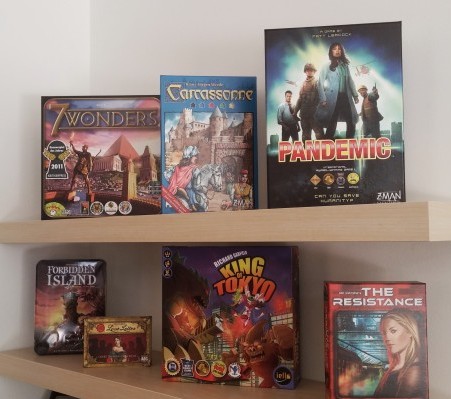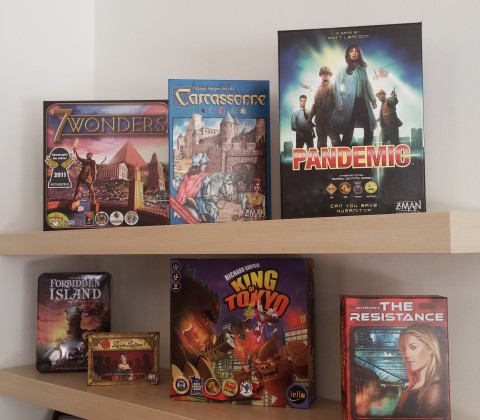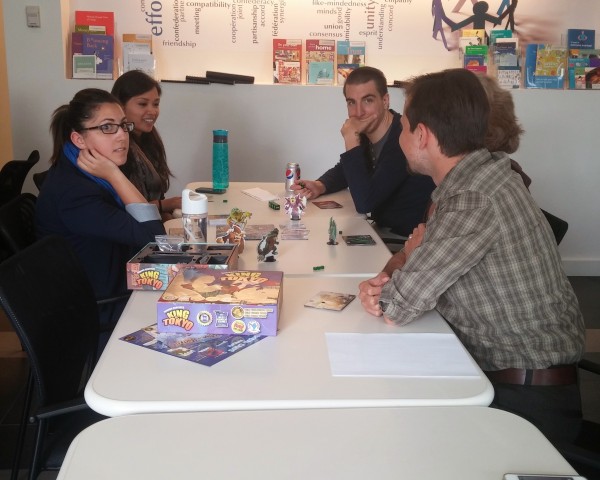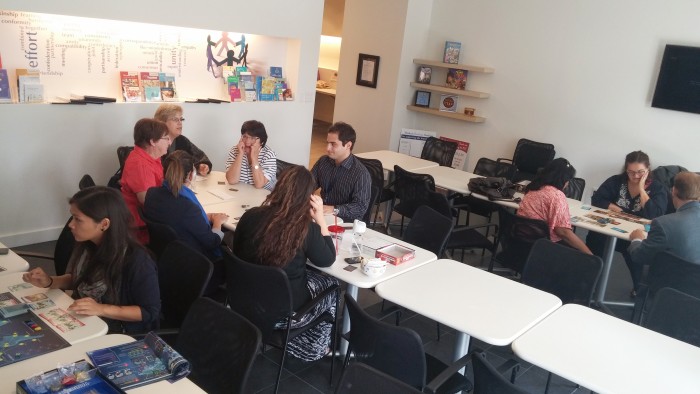

Getting your workplace to embrace board games
I frequently hear about the negative misconceptions that are attached to board games – considering it a kids’ activity, thinking that Monopoly and game of Life covers the entire available scope – you name it, I have heard it. Places of work specifically, with their focus on productivity and maintaining serious faces befitting highly functioning adults can be an especially challenging environment to spread the love of the hobby. However, difficult does not mean impossible, and where there is a will – there is a way.
In this article, I would like to share with you my experience that resulted in a board game shelf in our break room. It’s been such a great addition, and with the advancement of technology within the gaming industry, the guys have even considered investing in someone video games that we’ll all be able to play together online too. I’ve heard there are some remarkable space games available too, which I know everyone will love, so we might consider that! However, the board games seem to be a hit for everyone here. Maybe some of my experiences could help you in your advancing of the hobby. After all, is it not all about sharing what we love?
Before I begin, I will stress one thing very clearly. The primary purpose of you being at your work is most likely not board games (sorry). All I suggest here is that board games are a fun and engaging way to spend your break time when you are not required to work. In no way is it a substitute for actual productivity. Slacking off is not cool no matter you how to frame it. This will most likely mean limiting the length of games that you select – no Twilight Imperium for you. We are fortunate though, to have so many great games that play in under 45 minutes to choose from.
Therefore, let me tell you my story, framing it as a series of advice to advance board games at your work.
- Get it started.
First things first – you will not be able to do this alone. You need like-minded individuals to support you in your quest for mainstream board game acceptance. This has to start somewhere and the primary factor will be your willingness to put your passion on display. Maybe it is a board game on a shelf, or one of the various gaming art prints for sale on the internet, placed strategically in your office or cubicle to see if it catches an eye of a passerby. Maybe it is actually describing an amazing game that you played to the stereotypical “how was your weekend?” Maybe it is bringing up a board game in a discussion of a relevant theme. The primary goal here is to be confident of the message you are sending – that these games are a fantastic ways for adults to spend time together exercising their brains and having fun.
All you need is just one or two individuals initially. If you can get one gaming partner – great job, you can start coming up with games to try on your lunch break. The seeds are in place. That does not mean that you should stop though – slowly grow your group by maintaining your activity.
In my case, a conversation about Lord of the Rings led to an agreement that orcs and elves are awesome and next thing you know – an offer to play Lord of the Rings LCG is on the table. And in retrospect it is not even that great of a starting game. Do not be discouraged by misunderstanding and keep casting these lines!
- Recruit a few allies.
Once your core group of two or three gets in a regular game once a week or so – it is time to expand. What you are looking for is a larger group to be able to play larger (yet still quick) games like Resistance or Mascarade. It does not have to be social offerings as even Carcassonne or Lords of Waterdeep with five players is also very enjoyable. The goal here is to expand your group to the point where it can be considered more than just a few people. At this point not everyone might be making it to every game. Some people might be invited to check your group out without knowing anything about games. As long as your group remains the core, it will become your crucial base of support.
In my case, our core group eventually was extended to our department (which consists of six people). It helped that the department director was a part of our smaller group, so there was a sense of “blessing from those in power” in play. It is helpful but not necessary, though. It offered a great way to spend some time together in a non-work-related context and made our team members much more at ease with each other. Some people were not fans of games but quickly got on board with the help of the enthusiasm of the core group.
- Pitch the library
Now comes the most important and arguably toughest part of this whole exercise. You have to pitch the idea to your company to formally recognize and support the hobby. I will right away say that in some workplaces your chances of success are non-existent. However, any company that went as far as fed its’ employees a free pizza lunch is fair game. What it all comes down to is crafting your message to focus on the positives of the investment to your company:
- It is not expensive – the initial cost of the game library I procured was ~$175 – a price of a single pizza lunch for an organization of a decent size. Customize the price range according to your best estimate of what your company is likely to approve.
- It helps bring your staff together by giving them a joint activity. Human connections that form at the gaming table go a long way to ensure that people gel better as co-workers.
- It shows that the company cares. All companies say they care about their employees. Some actually do. Doing something nice like this is a great way to display.
Board games can provide your employees with something relaxing to do and de-stress in an engaging and fun way. Stress is a big obstacle in the workplace nowadays and counts for a rise in sick leave, employee turnover, and tensions in the workplace. Lots of employees who feel stressed turn to therapy or natural solutions like og kush online to relieve their stress in their own way. As an employer, if you dedicate some time each week for a game break you may find stress in the workplace melting away. Yes, no matter what your Agricola experience taught you board games can actually relieve stress! If board games aren’t your thing but your workplace allows you to smoke, consider buying cannabis products in bulk from sites like TheCBDinsider.com. These might help in elevating the mood and make you altogether stress-free!
You also need to highlight that the intended duration of the games does not exceed the allotted break time. Keep in mind – you are not asking your company for shinies. You are proposing a small investment that would benefit the company and the employees. Phrase your request accordingly. And have courage. The worst that can happen is you will hear a resounding no. No harm in asking – you return to your gaming group and you carry on.
In this crucial to ask your gaming group for support in writing this letter – description of your positive experience should be a part of the proposal and the signatures of those who are willing to lend their voice to your proposal will go a long way to raising your chances of success.
Do not forget to include the list of games you are suggesting. I am sure coming up with the list will be a lot of fun.
Here is the proposal I wrote up in case you will find it useful. After a review, it was approved and off I went to the friendly local 401 Games (ok, it was not as local for me but I needed the best selection and price and that is the place you go in Toronto for these things). I had a blast assembling the Boardgaming 101 collection.
- Teach the games.
It is not enough to have the games out on the shelf. People who have never heard of these will not crack them open just out of curiosity. We know that games are best taught with an expert teacher and so that was my next goal.
If your proposal is successful and the games have appeared in your break room – get your fellow existing board gamers to help you and send out an invitation for everyone who is interested to sit down and play the game with those who know how it works. Make sure people are teaching games they are comfortable with. There needs to be a teacher for every game that a sufficient number of people want to learn.
It is during this activity where the social aspect of games comes to the forefront – just watch people who have never done so place their first meeple! It is paramount for both you and other teachers to be at your most welcoming, patient and accommodating.
During our welcoming sessions, we taught people Carcassonne, 7 Wonders, Pandemic, Resistance and King of Tokyo. It was a great mix of people and while it was not as well attended as I would have hoped – we got some people to come and that is a victory in my books.
- Keep it going.
This next point is vague even for me. We have only just instituted the board game library and for now I am content to bask in the afterglow of that small achievement. I can actually see the boxes coming off the shelf at lunch and yes, sometimes people misplay the games completely, but it is definitely progress.
What it comes down to is exposing our wonderful hobby to new audiences. Since the games appeared, I have already heard from people who went out and got their own copies of Pandemic and King of Tokyo. I have heard people I have least expected to like games about how they taught Carcassonne to someone else. I see an impact – result of the fact that board games are, in fact, amazing and when people have a chance to see for themselves – it comes through.
That is what I wanted to see with this initiative – more mainstream acceptance, more new players. I know that in the future I will need to work further to make sure the games continue to be popular, but I expect these to become more popular. I also hope that my organization sees the value of this investment both in the fun that everyone has and in the better staff connections. Maybe we will even go as far as growing the collection – I never got that copy of Takenoko! Future holds exciting things and I look forward to making the most of it.
In Conclusion
As long as you are confident in the message, you are sending – “board games are a quality way for people to engage in social situations” – it will be received. It may even be formally supported. Build up your support, explain your reasoning, share your passion and you too can grow the board game hobby through your workplace!
If you have any further questions I would be happy to answer these – my contact information can be found here.
I would love to hear about board games at your work. What form does it take? Is it supported by the organization in any way? What do you play? Let me know in the comments.



Comments are Disabled